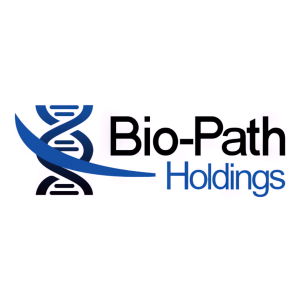Bio-Path Holdings Announces Successful Completion of Higher Dose Second Cohort in Phase 1/1b Clinical Trial of BP1002 in Refractory/Relapsed Acute Myeloid Leukemia (AML) Patients
BP1002 Offers Unique Opportunity for Venetoclax-Resistant AML Patients Utilizing RNAi to Limit AML Cell’s Ability to Produce Cancer Enabling Bcl-2 Protein
HOUSTON, April 18, 2024 (GLOBE NEWSWIRE) -- Bio-Path Holdings, Inc., (NASDAQ: BPTH) a biotechnology company leveraging its proprietary DNAbilize® antisense RNAi nanoparticle technology to develop a portfolio of targeted nucleic acid cancer drugs, today announced completion of the second dose cohort of the dose escalation portion of its Phase 1/1b clinical trial of BP1002 evaluating the ability of BP1002 to treat refractory/relapsed acute myeloid leukemia (AML) patients, including venetoclax-resistant patients.
“We are delighted to safely progress through the second, higher dose cohort to reach an important study milestone for the United States Food and Drug Administration (FDA) to review patient study data,” said Peter Nielsen, President and Chief Executive Officer of Bio-Path Holdings. “Enrollment rates have been good, and we look forward to advancing this study in even higher doses with the hope that we can sooner reach the combination therapy segment of our Phase 1/1b study with increased levels of BP1002 for the treatment of these vulnerable patients with few, if any, treatment options.”
BP1002 targets the protein Bcl-2, which is responsible for driving cell survival in up to
The Phase 1/1b clinical trial is being conducted at several leading cancer centers in the United States, including the Weill Medical College of Cornell University, The University of Texas MD Anderson Cancer Center, Scripps Health, and The University of California at Los Angeles Cancer Center. Initially, the dose escalation portion of the clinical plan calls for a total of six evaluable patients to be treated with BP1002 monotherapy over two dose levels in a standard 3+3 design, with a starting dose of 20 mg/m2 and the second dose of 40 mg/m2. The testing of these two dose levels is now complete and the clinical trial will pause for a brief data review by the FDA, and then we expect that dose testing will continue at the next planned higher dose of 60 mg/m2. The approved treatment cycle is two doses per week over four weeks, resulting in eight doses administered over twenty-eight days. The Phase 1b portion of the study is expected to commence after completion of BP1002 monotherapy cohorts and will assess the safety and efficacy of BP1002 in combination with decitabine in refractory/relapsed AML patients.
Gail J. Roboz, M.D., is the National Principal Investigator for the Phase 1/1b trial. Dr. Roboz is a professor of medicine and director of the Clinical and Translational Leukemia Program at the Weill Medical College of Cornell University and the New York-Presbyterian Hospital in New York City. Gary Schiller, M.D., The University of California at Los Angeles Cancer Center, Maro Ohanian, D.O., Department of Leukemia, University of Texas MD Anderson Cancer Center, and David Hermel, M.D., Scripps Health, are each serving as principal investigators.
About Bio-Path Holdings, Inc.
Bio-Path is a biotechnology company developing DNAbilize®, a novel technology that has yielded a pipeline of RNAi nanoparticle drugs that can be administered with a simple intravenous transfusion. Bio-Path’s lead product candidate, prexigebersen (BP1001, targeting the Grb2 protein), is in a Phase 2 study for blood cancers, and BP1001-A, a drug product modification of prexigebersen, is in a Phase 1/1b study for solid tumors. The Company’s second product, BP1002, which targets the Bcl-2 protein, is being evaluated for the treatment of blood cancers and solid tumors, including lymphoma and acute myeloid leukemia. In addition, an IND is expected to be filed for BP1003, a novel liposome-incorporated STAT3 antisense oligodeoxynucleotide developed by Bio-Path as a specific inhibitor of STAT3.
For more information, please visit the Company's website at http://www.biopathholdings.com.
Forward-Looking Statements
This press release contains forward-looking statements that are made pursuant to the safe harbor provisions of the federal securities laws. These statements are based on management's current expectations and accordingly are subject to uncertainty and changes in circumstances. Any express or implied statements contained in this press release that are not statements of historical fact may be deemed to be forward-looking statements. Any statements that are not historical facts contained in this release are forward-looking statements that involve risks and uncertainties, including Bio-Path’s ability to raise needed additional capital on a timely basis in order for it to continue its operations, have success in the clinical development of its technologies, the timing of enrollment and release of data in such clinical studies, the accuracy of such data, limited patient populations of early stage clinical studies and the possibility that results from later stage clinical trials with much larger patient populations may not be consistent with earlier stage clinical trials, the maintenance of intellectual property rights, that patents relating to existing or future patent applications will be issued or that any issued patents will provide meaningful protection of our drug candidates, the impact, risks and uncertainties related to global pandemics, including the COVID-19 pandemic, and actions taken by governmental authorities or others in connection therewith, and such other risks which are identified in Bio-Path's most recent Annual Report on Form 10- K, in any subsequent quarterly reports on Form 10-Q and in other reports that Bio-Path files with the Securities and Exchange Commission from time to time. These documents are available on request from Bio-Path Holdings or at www.sec.gov. Bio-Path disclaims any intention or obligation to update or revise any forward-looking statements, whether as a result of new information, future events or otherwise.
Contact Information:
Investors
Will O’Connor
Stern Investor Relations
212-362-1200
will@sternir.com
Doug Morris
Investor Relations
Bio-Path Holdings, Inc.
832-742-1369








